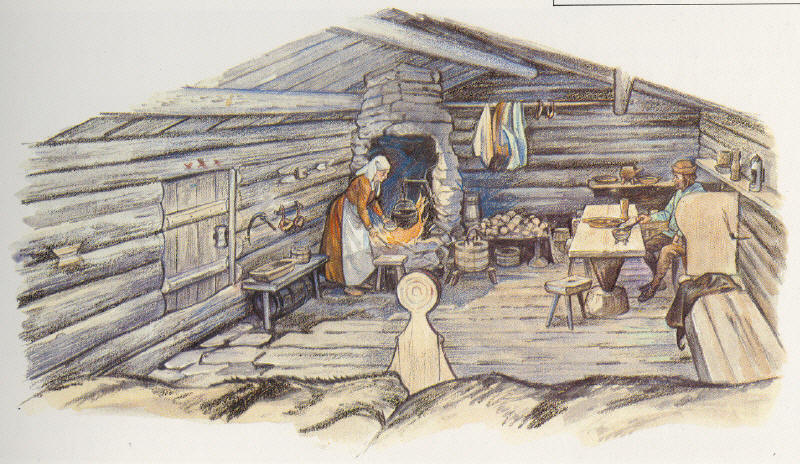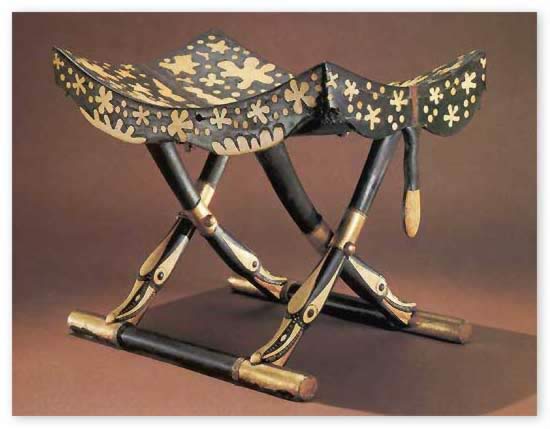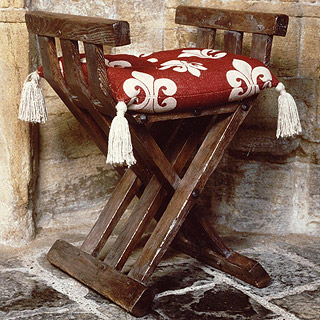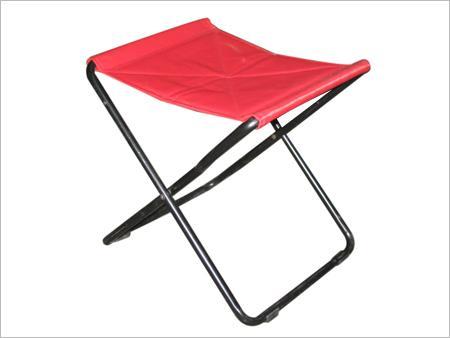Hello all,
I was wondering the other day-What kinds of furniture did our ancestors use in medival times? How was their design and construction different? What were the designs? How embellished were the peices?
I should think only the wealthist probably had "good furniture" at the time, the common people really couldn't afford that luxrury. If anyone has any pics I'd like to see them..... We've got a pretty good woodshop here, I'd like to try and make somthing simple if anyone has a design.
You might find these of interest:
Constructing Medieval Furniture: Plans and Instructions With Historical Notes
[url]http://www.amazon.com/exec/obidos/tg/detail/-/0811727955/104-3752666-3143931 [/url]
Medieval Furniture: Plans and Instructions for Historical Reproductions
http://www.amazon.com/exec/obidos/tg/detail/-...url][/url]
Constructing Medieval Furniture: Plans and Instructions With Historical Notes
[url]http://www.amazon.com/exec/obidos/tg/detail/-/0811727955/104-3752666-3143931 [/url]
Medieval Furniture: Plans and Instructions for Historical Reproductions
http://www.amazon.com/exec/obidos/tg/detail/-...url][/url]
The interior of a Swedish commoners house in the later 15th Century as reconstructed by Göte Göransson.
Havign lived in simialr type of hosue for several days under "medieval" conditions I can say that while they are a bit dark and smokey they also keep the bad weather outside and the warmt inside. With fresh straw and good beding and blankets one sleeps quite soundly after a day of what by medieval standards would be fairly light labor.
 Attachment: 105.74 KB
Attachment: 105.74 KB

Havign lived in simialr type of hosue for several days under "medieval" conditions I can say that while they are a bit dark and smokey they also keep the bad weather outside and the warmt inside. With fresh straw and good beding and blankets one sleeps quite soundly after a day of what by medieval standards would be fairly light labor.

There is one piece of furniture that seems to transcend culture and time. The folding X leg stool. It is a very simple, sturdy, and adaptable piece of furniture.
 Attachment: 26.52 KB
Attachment: 26.52 KB

King Tut's
 Attachment: 55.17 KB
Attachment: 55.17 KB

medieval
 Attachment: 12.93 KB
Attachment: 12.93 KB

modern

King Tut's

medieval

modern
Another fine case of thread necromancy...
[url]http://www.companie-of-st-george.ch/cms/intro.html
Follow the above link, through your language of choice, to the Company of Saynte George's periodical, The Dragon. A good number of issues feature line drawings of furniture taken from period art (most drawings by the great John Howe, at that!). The Company's living history efforts are focused on a specific time and place in history, but my guess is that basic furnishings were pretty constant in form.
The Victoria and Albert Museum, in London, is also a great source for this stuff. Their online images are nothing to being there, of course... They also publish catalogues of their shows, track down Gothic: Art for England, if you can. Expensive, but if you're into this stuff, well...
Best,
Eric
[url]http://www.companie-of-st-george.ch/cms/intro.html
Follow the above link, through your language of choice, to the Company of Saynte George's periodical, The Dragon. A good number of issues feature line drawings of furniture taken from period art (most drawings by the great John Howe, at that!). The Company's living history efforts are focused on a specific time and place in history, but my guess is that basic furnishings were pretty constant in form.
The Victoria and Albert Museum, in London, is also a great source for this stuff. Their online images are nothing to being there, of course... They also publish catalogues of their shows, track down Gothic: Art for England, if you can. Expensive, but if you're into this stuff, well...
Best,
Eric
Skip the Diehl books, they are full of minor errors and have no useful references.
Probably the best book on medieval western European furniture written in the English language:
Furniture in England, France and the Netherlands from the twelfth to the fifteenth century / by Penelope Eames
http://openlibrary.org/b/OL18613953M/Furnitur...th_century
Ole Wanscher's Sella Curulis is particularly useful for a comprehensive study of folding chairs throughout the ages.
http://openlibrary.org/b/OL3797606M/Sella_curulis
Another useful book for the relationship of moveables in historic homes.
Furniture, 700-1700 Eric Mercer
http://openlibrary.org/b/OL17556019M/Furniture__700-1700
All should be available through ILL at your reference library.
Probably the best book on medieval western European furniture written in the English language:
Furniture in England, France and the Netherlands from the twelfth to the fifteenth century / by Penelope Eames
http://openlibrary.org/b/OL18613953M/Furnitur...th_century
Ole Wanscher's Sella Curulis is particularly useful for a comprehensive study of folding chairs throughout the ages.
http://openlibrary.org/b/OL3797606M/Sella_curulis
Another useful book for the relationship of moveables in historic homes.
Furniture, 700-1700 Eric Mercer
http://openlibrary.org/b/OL17556019M/Furniture__700-1700
All should be available through ILL at your reference library.
| Kel Rekuta wrote: |
| Skip the Diehl books, they are full of minor errors and have no useful references.
Probably the best book on medieval western European furniture written in the English language: Furniture in England, France and the Netherlands from the twelfth to the fifteenth century / by Penelope Eames http://openlibrary.org/b/OL18613953M/Furnitur...th_century Ole Wanscher's Sella Curulis is particularly useful for a comprehensive study of folding chairs throughout the ages. http://openlibrary.org/b/OL3797606M/Sella_curulis Another useful book for the relationship of moveables in historic homes. Furniture, 700-1700 Eric Mercer http://openlibrary.org/b/OL17556019M/Furniture__700-1700 All should be available through ILL at your reference library. |
Thanks for the book references, they look quite useful, though the first seems hard to find.
I do, however, take issue with the first bit of advice. Though Diehl's books do a poor job of citing sources, and no doubt have some minor errors, that is hardly a rational basis to "skip them". AFAIK they are the ONLY books that actually provide scale drawings and parts lists. Seriously, do any of the above works you cite provide this level of useful detail? Doubt it. You can stare at the pretty pictures in Chinnery's book on British Oak Furniture all you want and accomplish absolutely nothing. Diehl's books will actually get you somewhere.
Of course, there are various online plans for Mediaeval furniture. Do a search on "Medieval furniture plans" and you should find a few excellent SCA websites with some good information. However, I would still get Diehl's books, since the errors are, in the end, fairly minor, and they are an excellent starting point for actually *building* something. Later, one can augment with deeper research, such as the works cited by Kel, to come up with something that will satisfy even the most A.R. authenticity nazis. But at a price point of around $15 apiece, you'd be an utter fool to NOT buy them... just bear in mind that they should not be taken as absolute gospel, only as a starting point, and you'll do just fine.
Here is a link from 'Blood and Sawdust"
http://www.bloodandsawdust.com/Blood_and_Sawd...ading.html
Couple of good points made in the reviews which accompany this reading list, particularly in regards to an author's viewpoint as an art historian, archaeologist, furniture maker, etc.; each will bring their own particular bias to their published work on medieval furnishings.
Something else to consider if you intend to make medieval period furniture, and that is whether or not you will use modern tools(including powered tools) or period style hand tools; sometimes the method of construction differs depending upon which tool set you use. In the end, you need to 'pound your own nails'.
And nothing wrong with the Diehl books as a "starting" point in your research as they are readily available at this point; as far as books go Henry Drummond said best "It is a good book, but it is not the only book"
http://www.bloodandsawdust.com/Blood_and_Sawd...ading.html
Couple of good points made in the reviews which accompany this reading list, particularly in regards to an author's viewpoint as an art historian, archaeologist, furniture maker, etc.; each will bring their own particular bias to their published work on medieval furnishings.
Something else to consider if you intend to make medieval period furniture, and that is whether or not you will use modern tools(including powered tools) or period style hand tools; sometimes the method of construction differs depending upon which tool set you use. In the end, you need to 'pound your own nails'.
And nothing wrong with the Diehl books as a "starting" point in your research as they are readily available at this point; as far as books go Henry Drummond said best "It is a good book, but it is not the only book"
| Barry C. Hutchins wrote: |
| Here is a link from 'Blood and Sawdust"
http://www.bloodandsawdust.com/Blood_and_Sawd...ading.html Couple of good points made in the reviews which accompany this reading list, particularly in regards to an author's viewpoint as an art historian, archaeologist, furniture maker, etc.; each will bring their own particular bias to their published work on medieval furnishings. Something else to consider if you intend to make medieval period furniture, and that is whether or not you will use modern tools(including powered tools) or period style hand tools; sometimes the method of construction differs depending upon which tool set you use. In the end, you need to 'pound your own nails'. And nothing wrong with the Diehl books as a "starting" point in your research as they are readily available at this point; as far as books go Henry Drummond said best "It is a good book, but it is not the only book" |
I agree with the comments on that recommended reading list. I also note that Diehl's books are absent on that list. I own both of them as well as many of the others listed. My disinclination to recommend them comes from using the patterns to the point of frustration. The Glastonbury chair - a frequently attempted project for medieval recreators - simply does not work as presented.
C. Gadda, if you use the books and like them - by all means recommend them. I have and therefore can not.
Page 1 of 1
You cannot post new topics in this forumYou cannot reply to topics in this forum
You cannot edit your posts in this forum
You cannot delete your posts in this forum
You cannot vote in polls in this forum
You cannot attach files in this forum
You can download files in this forum
All contents © Copyright 2003-2006 myArmoury.com — All rights reserved
Discussion forums powered by phpBB © The phpBB Group
Switch to the Full-featured Version of the forum
Discussion forums powered by phpBB © The phpBB Group
Switch to the Full-featured Version of the forum